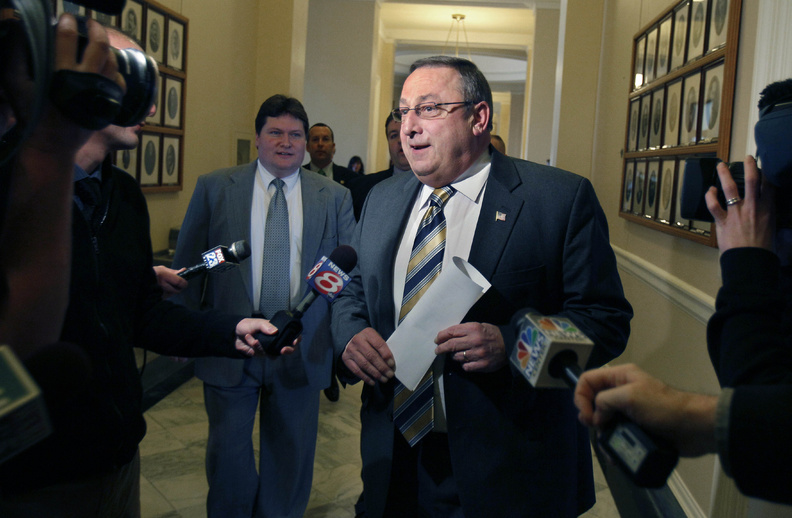The American electorate, nationally and locally, is often drawn to a political outsider who promises to transform government and public policy unfettered by traditions, process and past practices.
As a result, it’s relatively easy for a candidate to win an election by espousing lofty goals and ideas for changing government while avoiding detailed plans for accomplishing those goals.
Former President Jimmy Carter’s stumbling performance attempting to lead our country from 1977 to 1981 is perhaps our best example of the folly in the notion that experience is secondary to vision.
Carter’s failures also suggested that holding a lower office, governor, is not necessarily adequate preparation for the more complex demands of the presidency. The same could be said of George W. Bush, who was a spectacular governor of Texas, but was unable to find a similar groove as president.
This is all by way of saying that being mayor of Waterville is not the same as being governor of Maine.
Likewise, while it is alluring to the voting public to bring someone with business experience into government, serving as general manager of a highly successful retail business is not the same as running an entire state — no matter how much a person’s business experience teaches him about fiscal restraint and quantitative, measurable financial results.
Marden’s is not the same as the state of Maine.
There are myriad differences between his previous jobs and his new one, some obvious and some not so obvious, but Gov. Paul LePage has quickly become ensnarled in controversy because he is either psychologically and temperamentally unprepared for the challenges of his new job, or he has not accepted the reality that all semblance of private life for him has vanished.
His gaffes and poor judgment on issues early in his tenure indicate he has either surrounded himself with inexperienced or poor advisers, or that he does not take advice. Maybe it is a combination of both.
Maine is no different than most states: We face serious problems, financial and structural, in government, in businesses, in our quality of life. Problems multiply daily and many essential services are diminished.
Whether you voted for him or not, LePage is the governor and it would be petty and foolish to delight in his missteps and hope he fails. If he fails, Maine fails.
The governor should be given the opportunity to execute his plans for fixing the state’s problems, but at this point he stands as his own biggest roadblock.
He can help himself and in the process try to help the state. First, he needs to be aware that he has to control his temper and his penchant for the flippant remark. Every word he speaks is significant and open to interpretation and misinterpretation.
The public stage he stands on has been greatly expanded from the one he was accustomed to as a mayor and a business executive. Media are ever present, demanding constant and instant accountability. Avoiding the errant comment is essential. He needs patience and a calmer demeanor. He cannot avoid speaking in public. He cannot govern and be mute.
Legislating is labyrinthine at the state level, even in a small state such as Maine, and so results can be slow and winding. Compromise is essential.
So far, LePage has appeared inflexible on many fronts. If this trait continues, his legacy will be doomed.
When he makes a mistake he needs to acknowledge it; he needs to stop defending decisions and statements that were clearly ill-advised, or that the public finds objectionable.
He should not have hired his daughter for a state job, and when the complaints started he should have reversed his decision.
When he directed a rude remark at the NAACP, he should have apologized and he should have rearranged his schedule to attend the state’s biggest event marking the Martin Luther King Jr. holiday in Portland last Sunday evening.
Maine’s new governor can overcome what appear to be problems of temperament and he can compensate for his lack of experience handling a high level of public authority if he surrounds himself with competent advisers. And once those advisers are in place, the governor has to show he is willing to take their advice.
We need Gov. LePage to succeed so that our state and its people can succeed.
Richard L. Connor is CEO of MaineToday Media, owner of The Portland Press Herald/Maine Sunday Telegram. A newspaperman for 40 years, he has served on two Pulitzer Prize for Journalism nominating committees. He can be reached at: rconnor@pressherald.com
Copy the Story Link
Send questions/comments to the editors.



Success. Please wait for the page to reload. If the page does not reload within 5 seconds, please refresh the page.
Enter your email and password to access comments.
Hi, to comment on stories you must . This profile is in addition to your subscription and website login.
Already have a commenting profile? .
Invalid username/password.
Please check your email to confirm and complete your registration.
Only subscribers are eligible to post comments. Please subscribe or login first for digital access. Here’s why.
Use the form below to reset your password. When you've submitted your account email, we will send an email with a reset code.